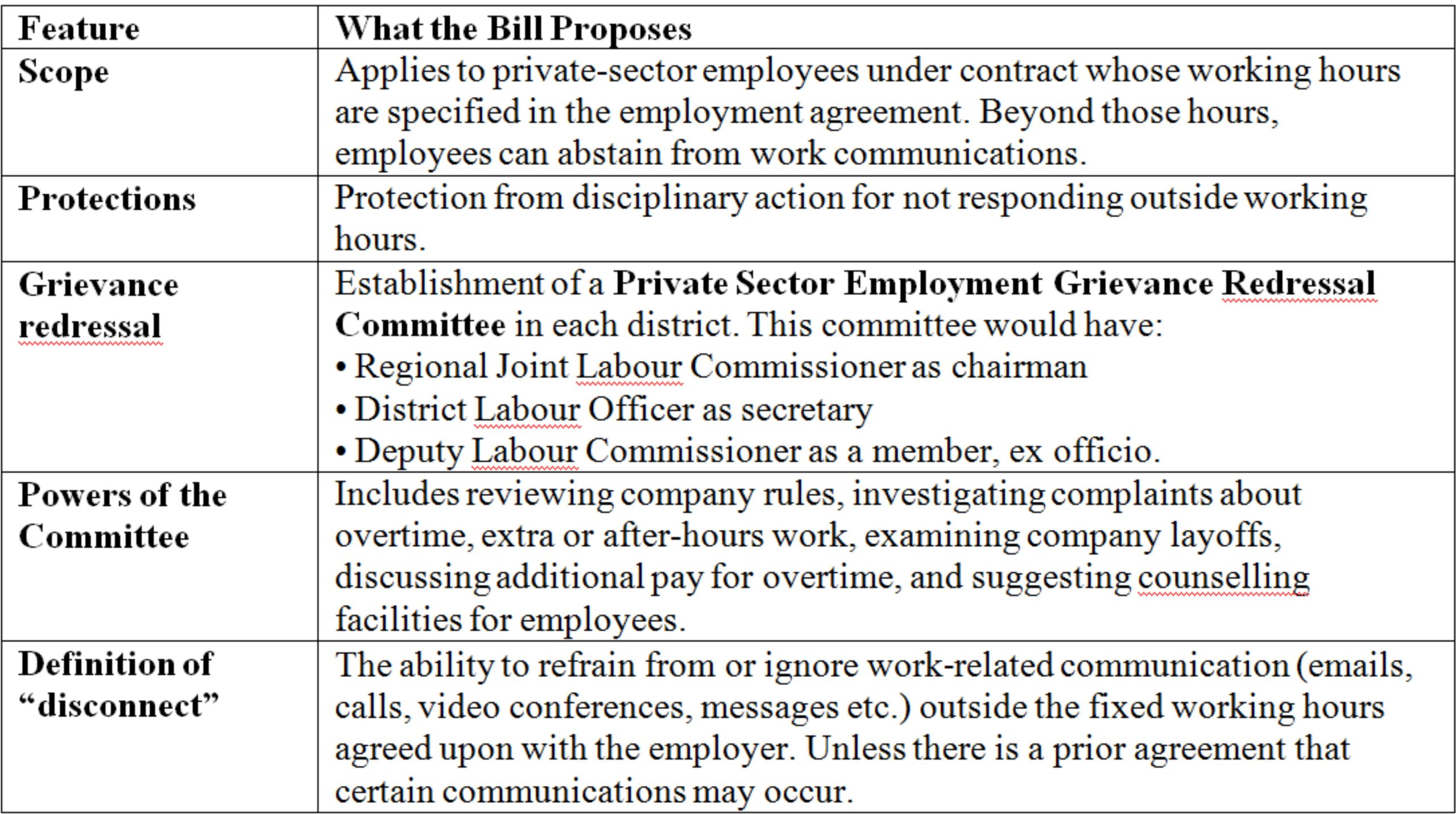The Kerala Right to Disconnect Bill (Bill No. 257), introduced by Dr. N. Jayaraj MLA, is a proposed private member’s bill in the Kerala Legislative Assembly. Its aim is to legally protect employees in the private sector from work-related intrusions outside their agreed working hours. This includes being contacted through calls, emails, video conferences, messages etc. beyond those hours.
The Bill also seeks to ensure that an employee who exercises this “right to disconnect” is not penalised in ways such as dismissal, demotion, withholding training or benefits, or other disciplinary action.
What bill proposes:

The Bill gains relevance because:
- Work-life balance & mental health: The always‐connected work culture—especially since COVID-19 (remote work etc.)—has blurred the lines between personal and professional time. Continuous after-hours communication can increase stress, burnout, interfere with rest, family time and leisure.
- Employee dignity and rights: It affirms that after hours belong to the employee, not the employer. It seeks to assert “personal freedom” and the dignity of private life.
- Precedent and policy innovation: If passed, Kerala would be among the first states in India to enact such legal protection, possibly setting a model for others.
Challenges :
Even if the law is passed, ensuring that private sector firms actually respect the “disconnect” right may be hard. Some infractions are implicit (expectation to reply, informal pressure), not just formal disciplinary actions. Grievance redressal committees will need adequate staffing, independence, powers, and awareness in both employees and employers.
Defining working hours and exceptions
What counts as “working hours” may vary by employment contract. There may be ambiguity if agreements are vague. There will be situations needing exceptions — emergencies, client demands in other time zones, business needs etc. Handling those fairly will be key.
Cultural & corporate norms
In many workplaces, there is already an “always-on” culture, where even if not formally required, employees feel pressure to respond outside hours. Changing norms is often harder than changing laws.
Since this is a private member’s bill, there is the question of whether the government will adopt it as government legislation, whether sufficient support exists in the assembly, and whether any amendments will weaken key protections.
Global Context
Some European countries already have legal or regulatory frameworks for the right to disconnect, especially in France, Spain, Portugal, etc. These laws typically require companies or employers to negotiate policies about after-hours digital communication. The Kerala Bill draws on international ideas of the right to rest, the Universal Declaration of Human Rights (UDHR) which in Article 24 provides for “rest and leisure, including reasonable limitation of working hours and periodic holidays with pay.”
Also read – Heritage Foods appoints Amit Shetty as Chief Human Resources Officer
Implications
If Kerala’s Bill becomes law, here are some anticipated implications:
- Better mental health / reduced burnout among employees in private sector.
- Employers will need to institutionalize clear policies about work hours, communication expectations. HR practices may change, as well as supervisory behaviour.
- Some sectors (e.g. IT, customer support, global businesses) may face operational adjustments due to demands from clients/customers in different time zones. They may negotiate clauses allowing limited after-hours work, but must do so transparently.
- It could encourage similar laws in other Indian states, or even at the central level, depending on how well it works.
Current Status & Developments
As of now, the bill has not become law, but there are important developments and signals worth noting. The bill remains in draft /proposal stage, and has not yet been passed into enacted law. Since it is a private member’s bill, its path to becoming law is more uncertain: it must be debated, possibly adopted by the government (i.e. tabled as a government bill), and go through legislative processes (committee hearings, amendments, voting) before enactment.
Media sources report that the Kerala Assembly may soon debate the bill in an upcoming session.
Conclusion
The Kerala Right to Disconnect Bill, 2025 is a bold move addressing deep-seated issues in modern work culture — work bleeding into personal time, increasing stress and reducing well-being. While the idea is simple, turning it into effective, enforceable law will require clarity in definitions, strong implementation mechanisms, and a shift in workplace culture. If done well, it could mark a significant benchmark for worker rights in India.
Stay connected with us on social media platforms for instant updates click here to join our LinkedIn, Twitter & Facebook








